Syria. The courage to make a fresh start.
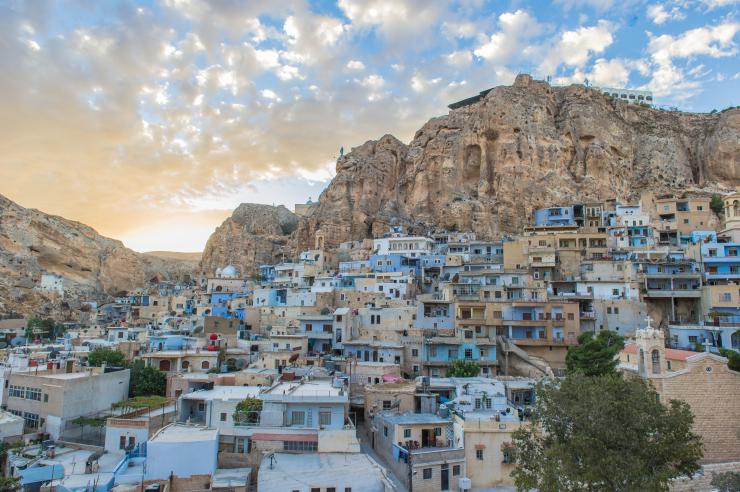
A journey to the last Christian village in the mountains of Syria where the language of Jesus is still spoken. Islamists almost wiped out the pilgrimage site during the war. Now there is hope again. Thanks also to a courageous nun.
As Ilias tells his story, he repeatedly strokes a wooden beam with his hand. However tenderly and carefully he does it, however much feeling he has for the wood, what he describes is sadly cruel. He is a man with powerful hands, a sharp eye and definitely not easily scared. He likes the feeling of being half a step ahead of destiny. It is not a mistake, especially not in his country of origin, Syria, a country that has known nothing but war since 2011.
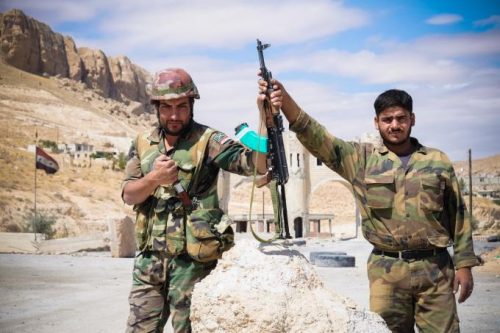
The soldiers of the Syrian National Army at the gates of the city. Shutterstock/ART production
In Maalula, a town 56 km northeast of Damascus, he thought, it would be even safer for him and his family. The remote village, inhabited by Christians for almost two millennia, had so far been spared from the fighting. It had no strategic or military importance and was far from the hotbeds of the revolt against President Bashar al-Assad. The village, its churches and its monasteries were all places of pilgrimage. Before the war, visitors came here from all over Syria, including Lebanon, Iran and Iraq, including Muslims.
There was also a good understanding with the local Muslim families. People knew and appreciated each other, and everyone lived their own life, which wasn’t bad thanks to tourism. But everything changed on September 7, 2013; that was when the inferno started.
Well-controlled anger
A rocky massif appears on the horizon, a jagged rock in which small white houses are set. From a distance, Maalula still looks idyllic today. Until the first road signs appear and you arrive at the ruins of the entrance gate where it all began with a car packed with explosives and with a man inside who blew himself up. This is how Ilias describes the beginning. The suicide bomber blew himself up at a Syrian army checkpoint. The way was clear for the self-proclaimed warriors of God. The Islamists stormed the village in their pickups.
They come in shooting and shouting. In a short time, they took the village. Anyone who did not convert to Islam would die, they announced and then took the first hostages.
Destroying Sacred Places
The Melkite Greek Catholic Monastery of Saints Sergius and Bacchus sits high above the rugged rocky slopes of Maalula.A thick-walled fortress, built starting from the year 313 AD. and therefore one of the oldest churches still existing in the world. Dedicated to two early Christian Roman soldiers who were killed for their faith, the monastery would again become a site of martyrdom during the Syrian Civil War.
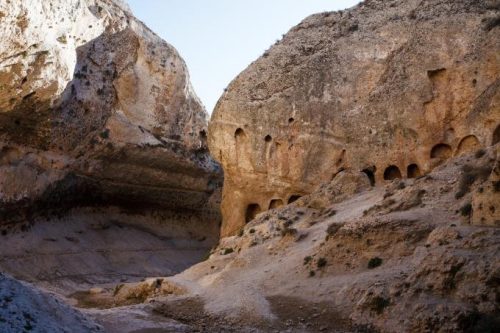
The gorge leading from Maaloula to the Monastery St Takla, Syria. 123rf
Broken crosses, destroyed icons and a desecrated altar. Many images of the Mother of God and the Messiah with their eyes erased. What happened here was not at all the result of blind hatred. It was well-calculated anger. An orgy of systematic destruction, perpetrated by the Islamists of the Al-Nusra Front. They invaded Maalula to destroy it and began by killing three Melkite monks.
The Our Father in Aramaic
Today is Sunday marked by the sudden ringing of church bells, a priest waving a thurible and singing the litanies. Those who remain remember the scenes of destruction and anger. Sunday Mass in the monastery is like waking up from a bad nightmare. Except it was real. What has happened since then is nothing short of a miracle. The monastery was rebuilt and the traces of the destruction present in the church were erased as much as possible. Local volunteers, in collaboration with Christian humanitarian organizations from around the world, have achieved the impossible and restored dignity to one of the most important places of ancient Christian faith.
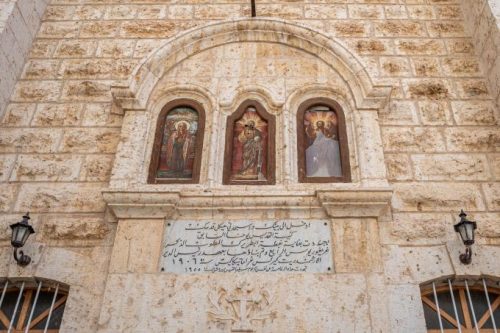
St. Thecla Monastery in the Christian village of Maaloula. Shutterstock/Torsten Pursche
Worshippers have even restored the altar slab, which had been smashed to pieces by Islamists and which dated back to ancient times when the building was still a pagan temple, as well as the channel through which the blood of sacrificial animals flowed. Some precious icons were also saved. The monks had smuggled them out of the village in coffins along with their dead. There is a real thrill when the Our Father is finally sung in Aramaic. Maalula is the last Christian village in Syria where the language of Jesus has survived to this day.
A woman who humbly sat at the back during Holy Mass is partly responsible for Maalula’s rebirth. Her name is Annie Demerjian and she belongs to the Congregation of the Sisters of Jesus and Mary.
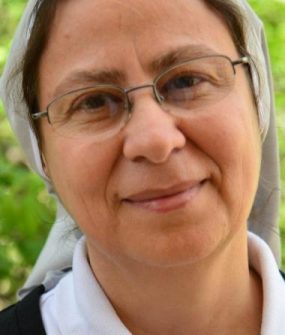
Sister Annie Demerjian (© Aid to the Church in Need)
After Mass, Sr. Annie takes us down a deep, narrow entrance and tells us how the first Christians once found refuge in the intermediate caves. One of them was Thecla, a noble woman who was a follower of the apostle Paul and was later canonized. According to legend, she led the Christians to the mountain, in front of which she began to pray until the saving ravine opened. This is how Maalula got its Aramaic name, which means “entrance”.Sister Annie, who grew up in the village, leads us to her family home, one floor of which remains burned to this day.Her brothers were taken hostage. “One of them pointed the barrel of the gun to my forehead and ordered me to recite the Shahada, the Islamic creed, in other words, to convert, only in this way would he let me live”, says one of the brothers who replied: “Go ahead. Just kill me. It’s better to die than live among people like you.” In the end, the two brothers were saved after the family paid a large ransom. Blindfolded, with their bodies completely battered, they were pushed out of a car in the middle of the night and abandoned in the middle of nowhere.
Profaned churches
As Sister Annie listens to her brother, she pats him on the shoulder. She soon realised that her home village would become her next mission. After months of siege, Assad’s army, together with Christian volunteers, managed to retake the city from the Islamists in April 2014. Most of the 3,000 residents, 70% of them Christians, had long since fled.
Maalula, the rock-hewn village, lay bleeding like an open wound. The churches had been desecrated and burned, the icons destroyed or sold abroad, and almost all the houses seemed uninhabitable. “We understood one thing – says Sister Annie – If we want this place to have a future and not disappear forever, we must give it one”. That was how Sister Annie and Ilias crossed paths.
A mission of reconstruction
Ilias had brought his family to safety in those disastrous days and had resisted with the other men to defend the village. “When the Islamists realised we were fighting back, they moved to the mountains above Maalula.” They entrenched themselves on top of the pilgrims’ hotel and the Melkite monastery and from there began targeting the village. “They made fire bombs and threw them at the village with burning car tyres. Our churches and houses here are tens of centuries old, they are built of clay, stone and wood. We had no chance but to die in the flames “. Ilias who, like Sister Annie was born here, had to flee.
“I prayed to Our Lady that in the end good would triumph over evil. I laid all our destinies at her feet and the moment I left, I felt I would return. God would not abandon us.”
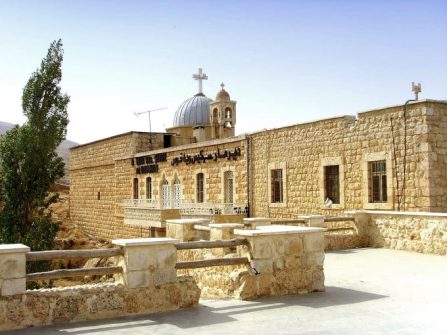
The monastic complex of Saint Sarkis. Photo: Effi Schweizer
That’s exactly how it happened. Ilias, an architect by training, and Sister Annie, a courageous nun, developed a joint plan. She wanted to raise funds from Christian humanitarian organizations so that Ilias could use them to start rebuilding the old houses. From the start, they had no idea of all the difficulties they would meet. Looking at the oldest part of the village, they could see some buildings that were built in the first and second centuries AD. The narrow alleys and roadways were repeatedly interrupted by stone gates. It took a lot of skill, patience and money but the results are impressive: 108 houses have already been rebuilt thanks to generous donations and another 40 are planned. The original inhabitants began to return. Many of them had already fled to Damascus but never lost hope that they would again see Maalula.
The Mother of God watches over Maalula
“Making a fresh start is difficult,” admits Sister Annie, “because, unlike in the past, only a few pilgrims who once lived in the place come to visit. Syria’s economy is ruined, the people are poor, many are hungry, the sanctions are working. There is electricity for maybe an hour a day and prices continue to rise dramatically. Efforts are being made to find other sources of income for the returnees. A small jam factory has been established, peaches have recently been grown and now, after such a long time, wine production is thriving on the slopes of Maalula.
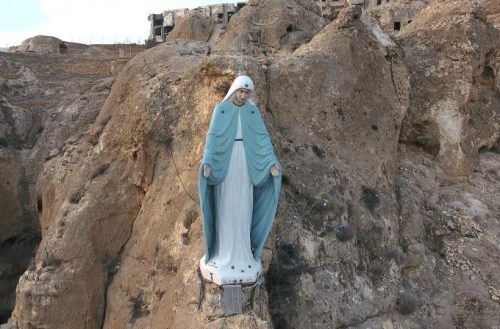
Virgin Mary in the mountains around Maalula. Shutterstock/ Fly and Dive
Primary and secondary schools are again open. No one has regretted returning, as Samen Kalloume says. He sits in a wheelchair, runs a small business with his wife and was one of the first to return to the village after it was cleared of mines by Islamists. The house where he was born is one of those that have been rebuilt. Looking out the window, he can see many of the village’s 22 churches, which are gradually being restored to their original form. “It will never be the same again,” he says, “but this applies to all of Syria. We are all suffering; we are all fighting. But here I have a refuge and I am closer to our Lord than anywhere else.”
He lifts his gaze to the three-metre statue of the Mother of God perched on a rock above Maalula. Islamists destroyed the original in the early days of their reign of terror. Now she has returned as the “Patron saint of peace” thanks also to the help of some local Muslims. Mary is once again watching over Maalula. (Open Photo: Maaloula, a small Christian village in the Rif Dimashq Governorate in Syria. Shutterstock/ Anton_Ivanov)
Christoph Lehermayr/allewelt



